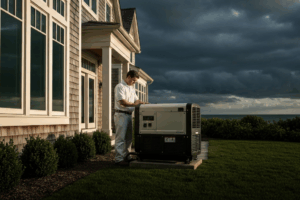
What’s New in the NEC 2023? Key Changes Electricians Must Know
The Expanding World of GFCI Protection
One of the most significant nec 2023 changes is the aggressive expansion of Ground-Fault Circuit-Interrupter (GFCI) requirements. For years, electricians have associated GFCI with receptacles near sinks and in wet locations, but the new code dramatically broadens this scope to enhance personnel safety in more areas than ever before.
Dwelling Unit Kitchen GFCI for All Receptacles
The 2020 NEC focused on countertop receptacles, but the 2023 NEC takes a huge leap forward. Per Section 210.8(A)(6), dwelling unit kitchen GFCI protection is now required for all 125-volt through 250-volt receptacles in kitchens. This means every receptacle—whether it’s behind the refrigerator, for a gas range, or for a microwave—must now be protected. This change from a location-based rule (near a sink) to a room-based rule simplifies compliance and acknowledges that shock hazards exist throughout the entire kitchen. Whether using a gfci outlet or a gfci breaker, electricians must now account for every connection point.
GFCI Protection for Appliances and Outdoor Outlets
The expansion doesn’t stop with kitchen convenience outlets. Per Section 210.8(D), GFCI protection for appliances is now mandated for outlets serving listed appliances rated 150 volts or less to ground and not exceeding 60 amperes. This is a critical update, as it extends protection to higher-powered equipment that was previously exempt, though it’s important to note that examples like clothes dryers and wall-mounted ovens are only covered if they fall within these specific voltage and amperage ratings. Furthermore, the rules for outdoor outlet GFCI have been clarified and expanded under 210.8(F) to explicitly include receptacles in garages, accessory buildings, and boathouses, ensuring greater safety in areas prone to moisture.
NEC 2023 Surge Protection: The New Standard
While GFCI and arc fault breaker (AFCI) protections have been code staples for years, the NEC 2023 surge protection requirements mark a significant shift toward safeguarding sensitive electronics. Following the groundwork laid in 2020, Section 230.67 now mandates a Type 1 or Type 2 Surge Protective Device (SPD) for all services supplying dwelling units, dormitories, hotel guest rooms, and patient sleeping areas in care facilities. This requirement applies to both new installations and service equipment replacements. The code also specifies that the SPD must have a nominal discharge current rating of at least 10kA, ensuring a robust level of protection against transient voltage. This change reflects the modern home’s reliance on expensive, microprocessor-based electronics that are vulnerable to surge damage.
Enhanced Safety: Emergency Disconnects and Labeling
First responder safety is a primary driver behind several key updates in the 2023 code, particularly regarding emergency disconnects and arc-flash labeling.
Emergency Disconnect Requirements
First introduced in the 2020 cycle for services, the emergency disconnect requirements have been expanded. Per Sections 230.85 and 225.41, a readily accessible outdoor emergency disconnect is now mandated for all new and replaced services and feeders supplying one- and two-family dwelling units. This ensures that firefighters can de-energize a building quickly and safely, regardless of how it is supplied. The disconnect must be clearly marked “EMERGENCY DISCONNECT.”
Arc-Flash Labeling Updates
Worker safety during maintenance is addressed through updated arc-flash labeling updates. Section 110.16(B) now requires field- or factory-applied arc flash labels on service and feeder equipment rated 1,000 amperes or more, a reduction from the previous 1,200-ampere threshold of the NEC 2020. These labels, governed by NFPA 70E standards, must include critical information like the arc-flash boundary and the required PPE. This change underscores the importance of a thorough electrical preventive maintenance program and clear hazard communication.
Major Shifts in Power, Circuits, and Systems
The 2023 NEC also introduces several forward-thinking changes that adapt to new technologies and installation practices, affecting everything from circuit capacity to kitchen design.
- 10-Amp Branch Circuits: In a nod to high-efficiency LED lighting and other low-power loads, the NEC, per Section 210.23, now officially recognizes 10-amp branch circuits for specific applications like lighting outlets and certain dwelling unit exhaust fans. This gives electricians more flexibility in designing efficient systems.
- Island and Peninsula Receptacle Provisions: In a surprising reversal, Section 210.52(C) no longer mandates a receptacle for kitchen islands and peninsulas. However, if a receptacle is installed, it must be located on or in the countertop or work surface, discouraging dangerous cords from hanging over the edge. More details on this specific change can be found by reviewing how the 2023 NEC updates have changed kitchen island receptacle requirements.
- New Class 1 Power Systems: To better organize the code, previous rules for Class 1 circuits have been moved from Article 725 to the new Article 724. These new Class 1 power systems are defined as circuits limited to 30 volts and 1,000 volt-amperes, providing clearer guidelines for these common control and signaling circuits.
The Future Is Here: Cybersecurity and Equipment Standards
Perhaps the most forward-looking change is in Section 110.3(C), which introduces cybersecurity in electrical systems for specific equipment. This new requirement mandates that network-connected life-safety equipment be evaluated for its ability to withstand malicious attacks during its listing and labeling evaluation. This applies to systems like generator controls and automatic transfer switches for legally required standby systems, acknowledging that cyber threats can impact physical safety.
Additionally, the code provides clearer reconditioned equipment standards in Section 110.20 and throughout various articles. It explicitly prohibits the reconditioning of certain safety devices like a molded-case arc fault breaker, GFCI devices, and non-renewable fuses, while setting strict labeling and verification requirements for equipment that is permitted to be reconditioned.
The 2023 NEC also continues to refine requirements for selective coordination, working clearances for equipment, and even touches on the needs of emerging technologies. For instance, the code includes evolving rules for EV chargers, a topic explored further in our lesson on how 2023 NEC rules are changing EV charger installation requirements.
Staying current with the NEC is non-negotiable for professional electricians. These changes not only ensure compliance but also empower you to provide safer, more reliable, and more efficient installations for your clients. To master these new requirements and earn your CEUs, browse our state-approved courses today.
Disclaimer: The information provided in this educational content has been prepared with care to reflect current regulatory requirements for continuing education. However, licensing rules and regulations can vary by state and are subject to change. While we strive for accuracy, ExpertCE cannot guarantee that all details are complete or up to date at the time of reading. For the most current and authoritative information, always refer directly to your state’s official licensing board or regulatory agency.
NEC®, NFPA 70E®, NFPA 70®, and National Electrical Code® are registered trademarks of the National Fire Protection Association® (NFPA®)



